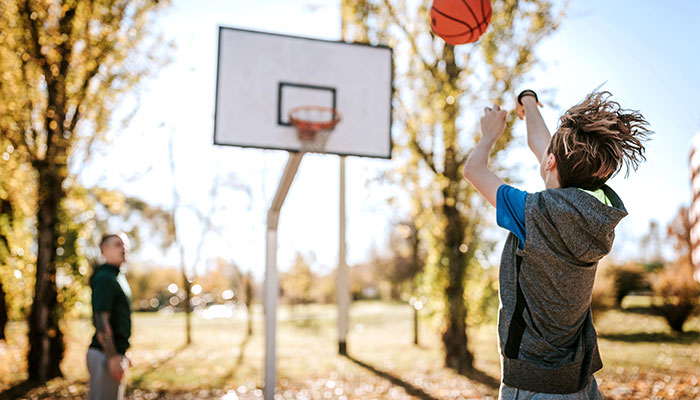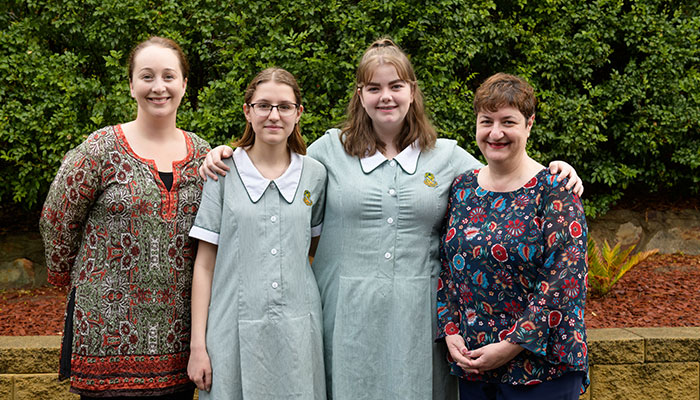There’s a whole lot more stress than usual on the shoulders of the 50,000 or so Year 12 students who are locked-down in Greater Sydney for at least the next fortnight, as they head into their Higher School Certificate exams in October.

Battling uncertainty: Kirrawee High School Year 12 student Hayley Smith would like to be back at school quickly both for the learning environment and the milestone events marking her final year.
“Our trial exams have now been postponed twice, and it’s so hard to have the uncertainty of not knowing when we will go back to school for the last term of our whole school career,” says Hayley Smith, who is a Year 12 student at Kirrawee High School in southern Sydney.
“It’s also hard to learn new content, and study effectively – and I personally cannot learn well from home, it doesn’t work for me,” she says.
Adding to the disappointment for Hayley, who is co-captain of her school, is missing out on fun events like fundraisers and competitions which traditionally mark the final year of school.
How to study without stress
Psychology Professor Viviana Wuthrich from Macquarie University’s Centre for Emotional Health says her research highlights strategies to help HSC students lower their lockdown stress levels.
Wuthrich has led a major research project tracking stress, depression and anxiety in over 600 young people during their final year of secondary school in 2019, which is continuing.
She found that between 20 to 30 per cent of students experienced severe distress over the course of their final year, and symptoms of stress and anxiety increased over time.
Exercise is even more important in lockdown because you don’t have any of your usual incidental exercise, like walking to the bus or train, even walking from one classroom to the next classroom.
The research found that students who already experienced anxiety, who had fewer connections with their peers and who weren’t great at controlling their emotions were more likely to show distress.
“The pandemic has introduced further stress with uncertainty around lockdowns, concerns about safety and older family members and the repeated changes to things like exam timetables,” says Wuthrich.
“There are a number of things we know about managing HSC stress that will apply to this cohort, even though they're in a unique situation with lockdown,” says Wuthrich.
“It’s quite normal to feel stressed before a major event like this; having a moderate level of stress can help students focus and prepare – but too much is damaging.”
Ten tips for managing HSC prep in lockdown
1. Keep in touch with friends
Wuthrich says that maintaining contact with peers is an important part of managing stress for students, regardless of whether you’re in lockdown or not. Part of that is recognising you’re not the only one going through this experience – but it’s also important to have some fun, talk and laugh and have some social downtime together.
“Our research found that kids who had strong peer connections and felt supported by their friends, were less likely to experience severe stress during their HSC year,” says Wuthrich.
2. Balance study and life
With sport and other activities on hold, maintaining your study/ life balance in lockdown means taking breaks from screen time to do fun things, says Wuthrich. “Read a book, listen to music, bake a cake, go for a walk or just dance in your room," says Wuthrich.

“It’s really important that students don't try and study all day long, because they can end up getting burnt out.
“Some students over-commit in Terms one and two and then in the lead-up to the exam, they’re exhausted, they've emotionally checked out.”
3. Keep to a routine
“Days can blur into nights, especially when time outside is limited,” says Wuthrich.
“HSC students – particularly in lockdown – will really benefit from a routine. Start with breakfast, log into school on time, stick to your class schedule, and take recess and lunch breaks,” she says.
“Sticking to a routine keeps you mentally prepared for your work, and regular meals can help you avoid the mindless eating that can happen when you're bored and you're just sitting around trying to study.”
4. Prepare yourself (and your brain) for learning
Not everyone has space to study outside of their bedroom, but it helps to set up your own ‘learning mindset’ work space.
“Our brains respond to cues in our environment, so set up your physical space in a way that helps you get psychologically in a zone for learning,” says Wuthrich.
She says that research shows that our ability to recall things is better when we learn that information in the same context, as when we must remember the information.
- How Pokemon Go 'kept people sane' during lockdown
- Lockdown binge: the best Victorian-era TV shows to watch now
“Our brains store information all over the place and connects it up via neural pathways – so by activating one of these, we can light up all of the other connections.”
Being at school and wearing a uniform are cues – but so is sitting at a desk or table rather than sprawling on your bed.
“You’re not going to be able to turn your bedroom into an exam centre – but you can do certain things like ditch the PJs and sit at a desk to put your brain in learning mode,” Wuthrich says.
5. There's no such such thing as multi-tasking - so switch off the music
It's common for people think that listening to music helps them to study, but our brains are not very good at task-switching, says Wuthrich.

“When you listen to music while you try to study, your brain is constantly switching between listening and studying, listening and studying," she says.
Home can be noisy, especially when younger siblings are also trying to home-school, so students who use headphones to block external sound could use low music with no vocals, or even white noise like the sound of wind or the sea.
“The key is to turn it right down, and keep it instrumental,” says Wuthrich. “Vocals will alert your brain to try to catch some of the lyrics - and every time your brain does that, you’re not paying attention to the actual task you're trying to focus on.”
She says there’s plenty of research that shows multi-tasking when you are trying to learn something will dramatically reduce your ability to recall that information later.
6. Exercise your stress cortisol away
One of the many benefits of exercise is that it burns away the main stress hormone, cortisol, says Wuthrich.

“Exercise is even more important in lockdown because you don’t have any of your usual incidental exercise, like walking to the bus or train, even walking from one classroom to the next classroom.”
Higher intensity exercise will also burn up cortisol more effectively, so do something that really increases your heart rate – go for a run, do some skipping or star jumps, just a few minutes will burn up that stress.
We experience more stress when we feel like a challenging situation is out of our control, so we can address that by focusing on the things that we have control over, like how much exercise we do.
Reducing cortisol levels will help students to learn better, Wuthrich adds.
“We know the optimal performance for HSC exams is about having a moderate level of stress – because when we are moderately stressed out, our brain is particularly alert to the tasks that we're trying to focus on,” she says.
There is evidence that being in an optimal stress zone will improve performance on an exam – but students need to find their balance.
For high-stress individuals, that can mean reducing their anxiety levels, and for less-motivated students, it’s time to ramp up the pressure they put on themselves.
7. Find the positives
There’s evidence that by reflecting on the positive things about our situation, we can lower our stress levels.
“We experience more stress when we feel like a challenging situation is out of our control, so we can address that by focusing on the things that we have control over, like how much exercise we do, what and when we study,” she says.
There are usually some positives – some students like working remotely and setting their own pace, for example. And for many students, lockdown means they get back a few hours each day that they may have been commuting to school.
“There’s more time available in the day to study – but also more time to do some of the things that we know reduce stress, like exercise, talk to friends and relax.”
8. Take a tip from Grandma
Recent research has shown that older people have been shown to cope better with stressful situations such as lockdown, than younger people.
Some of the reasons include that they are more accepting of the situation, more optimistic that it will probably work out, they reflect on how they have coped with past stressors and realise that they can probably get through this too.
“Applying some of this wise advice from your grandparents might just help,” says Wuthrich.
9. Ask for help
If you're unclear about the work you need to do or don’t understand something, contact your teacher – and persist.
“Teachers are often struggling through this too, managing lots of questions, so if they don’t reply to your question in Google classroom, email the teacher direct – don’t give up,” says Wuthrich.

Getting help can be harder in lockdown, because in a classroom there’s lots of incidental opportunities to raise a question with your teacher; students might also feel embarrassed to write a question in front of the class in case they are the only person who doesn’t understand.
“When you’re an HSC student, you need to over-ride that anxiety about asking questions and take on the responsibility to get the help you need.”
10. Remember the situation will pass
Wuthrich has saved her top tip for last: “Remember that it’s not too long before lockdown will be over, and the HSC will be over, and all this will be in the past,” she says.
“If it’s feeling overwhelming, think: can you do this for another 60 days, knowing that’s the end of it?”
She says the same strategy can apply to lockdown, even if it drags on for six or eight weeks.
“This process works because it stops the catastrophising thoughts that say: this is a disaster, I can’t cope.”
Wuthrich says that it can also help to look how far you have come already.
“In lockdown, for example, we’re talking about something that's going to go on for perhaps another three weeks – you have already done three weeks of this; and you actually did this last year – and it sucked, but you can definitely get through it again.”

Professor Viviana Wuthrich , pictured, is a Professor in the Department of Psychology and was part of NSW Education’s Expert Advisory Group developing student wellbeing resources including brochures to help students manage HSC exam stress.
Need more help?
The Macquarie University Centre for Emotional Health developed a program called Study without Stress, a Cognitive Behavioural Therapy program that teaches students to manage study stress, which includes a range of two-hour workshops for schools.



